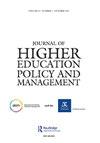Letter from the Editors
IF 2.7
3区 教育学
Q1 EDUCATION & EDUCATIONAL RESEARCH
Journal of Higher Education Policy and Management
Pub Date : 2023-05-04
DOI:10.1080/1360080x.2023.2226478
引用次数: 0
Abstract
Dear Colleagues, Welcome to our third issue for 2023, following on from our special issue focused on equity and inclusion policy in higher education. A big thank you to our guest editors Denise Jackson and Ian Li, and all the contributors to that special issue. Our first two articles in this issue offer new theoretical and practical perspectives on (de)colonialism in higher education. Savo Heleta and Samia Chasi reimagine the definition of internationalisation from a decolonial lens, unpacking dominant internationalisation definitions and applying them to contemporary South Africa. Jing, Ghosh and Liu examine how neocolonialism operates in international branch campuses, outlining the careful balance between mimicry of the Western education practices of the home university against local campus needs. There are many policies and interventions that seek to address the underrepresentation of women and ethnic minority groups in the academic workforce. One direct approach taken by The University of Melbourne has been affirmative action. Guillemin, Wong and Such review the implementation and effectiveness of numerical targets in recruitment to redress unequal opportunity for women in Science, Technology, Engineering and Mathematics (STEM), concluding with some important lessons. Inequality in recruitment may also be redressed through better training and awareness of implicit bias. Although these practices are common, there is a lack of evidence for their efficacy. Betsy Lehman and colleagues examine the effects of a mandatory bias literacy program for academic staff at an American public university, concluding that the recency of training and the ability to put training into practice are crucial factors. Academic work has dramatically changed over the past two decades towards more teaching-focused roles, auditing of teaching quality and research outputs, and general ‘hyper-performativity’ pressures. However, understandings of knowledge creation in teaching-focused roles remain underdeveloped. Godbold, Matthews and Gannaway apply a learning-practice conceptual framework, aiming to capture and recognise the complexity of these roles. The academic sabbatical used to be a right for almost all academics, offering a period of rest, recuperation and academic travel. Bruce Macfarlane documents how sabbaticals have undergone a transformation over time and are now a privilege for a minority, narrowly configured towards research outputs. To round out the issue we have two book reviews. We have Riana Tambunan’s review of The right to higher education: a political theory by Christopher Martin. This is followed JOURNAL OF HIGHER EDUCATION POLICY AND MANAGEMENT 2023, VOL. 45, NO. 3, 259–260 https://doi.org/10.1080/1360080X.2023.2208456编辑的信
欢迎大家阅读我们2023年的第三期,这是继《高等教育公平与包容政策》特刊之后的第三期。非常感谢我们的特邀编辑丹尼斯·杰克逊和伊恩·李,以及本期特刊的所有撰稿人。本期我们的前两篇文章为高等教育中的(去)殖民主义提供了新的理论和实践视角。萨沃·赫莱塔和萨米娅·查西从非殖民的角度重新构想了国际化的定义,拆解了主流的国际化定义,并将其应用于当代南非。Jing, Ghosh和Liu研究了新殖民主义如何在国际分校中运作,概述了在模仿本国大学的西方教育实践与当地校园需求之间的谨慎平衡。有许多政策和干预措施试图解决妇女和少数民族群体在学术队伍中代表性不足的问题。墨尔本大学采取的一种直接方法是平权行动。Guillemin, Wong和Such回顾了数字目标在招聘中的实施和有效性,以纠正女性在科学、技术、工程和数学(STEM)领域的不平等机会,并总结了一些重要的经验教训。招聘中的不平等也可以通过更好的培训和对隐性偏见的认识来解决。虽然这些做法很常见,但缺乏证据证明它们的有效性。贝琪·雷曼(Betsy Lehman)及其同事研究了美国一所公立大学的学术人员强制性偏见扫盲计划的影响,得出的结论是,培训的近时性和将培训付诸实践的能力是关键因素。在过去的二十年里,学术工作发生了巨大的变化,越来越多地转向以教学为中心的角色,审计教学质量和研究成果,以及普遍的“超高绩效”压力。然而,对以教学为中心的角色的知识创造的认识仍然不够充分。戈德博尔德、马修斯和甘纳韦运用了一个学习-实践的概念框架,旨在捕捉和认识这些角色的复杂性。学术休假曾经是几乎所有学者的权利,提供一段时间的休息、休养和学术旅行。Bruce Macfarlane记录了随着时间的推移,休假是如何经历转变的,现在是少数人的特权,被狭隘地配置为研究成果。为了完成这个问题,我们有两篇书评。我们有Riana Tambunan对高等教育权的评论:Christopher Martin的政治理论。《高等教育政策与管理学报》2023年第45卷第1期。3,259 - 260 https://doi.org/10.1080/1360080X.2023.2208456
本文章由计算机程序翻译,如有差异,请以英文原文为准。
求助全文
约1分钟内获得全文
求助全文
来源期刊

Journal of Higher Education Policy and Management
EDUCATION & EDUCATIONAL RESEARCH-
CiteScore
5.30
自引率
7.70%
发文量
52
期刊介绍:
The Journal of Higher Education Policy and Management is an international journal of professional experience and ideas in post-secondary education. It is a must read for those seeking to influence educational policy making. The journal also aims to be of use to managers and senior academic staff who seek to place their work and interests in a broad context and influence educational policy and practice.
 求助内容:
求助内容: 应助结果提醒方式:
应助结果提醒方式:


